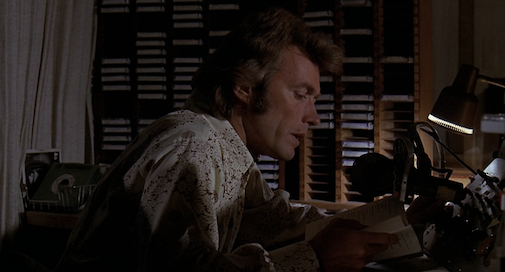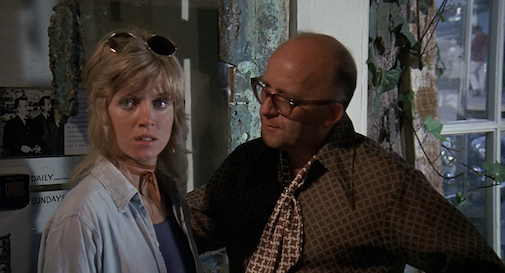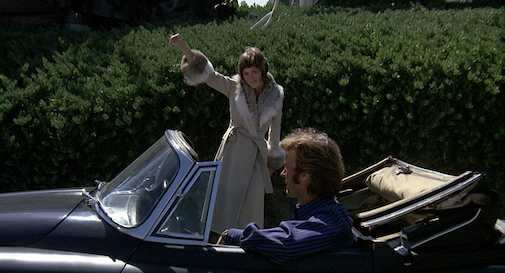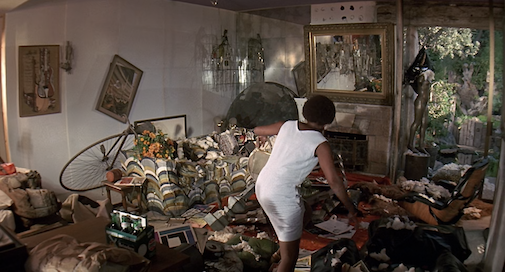50th Anniversary: "Play Misty for Me"
 Thursday, October 21, 2021 at 10:42AM
Thursday, October 21, 2021 at 10:42AM by Nick Taylor

Happy 50th anniversary to Play Misty for Me! The 1971 directorial debut of notoriously productive actor/director/writer/composer Clint Eastwood received a new wave of attention earlier this year in the wake of lead actress Jessica Walter’s still-unthinkable death at age 80. Nathaniel mentioned the film in his in memoriam piece, but with its anniversary upon us it seemed right to give the film a deeper dive. The story is a tale as old as time - boy meets girl, boy and girl have a liaison, boy realizes girl is dangerously invested in their relationship and that one of them will probably die. Fatal Attraction would take that fable in an iron grip once it hit the screens, imbuing it with its own peculiarities, but Play Misty for Me is very much its own beast. That’s partially the beauty of launching before the film that will eventually define your subgenre...
Play Misty for Me is entirely devoid of backstory or MO’s or scrapbooks full of psychotic episodes. It’s a slice-of-life film about a guy who ends up dating a woman who’s dangerously obsessed with him, putting Eastwood’s taciturn masculinity somewhere between the rugged capability of Dirty Harry and the lust-inspiring, threatened intrigue of The Beguiled. More than anything, it's a damn good time, all thanks to the woman in question.
Our hero is, of course, Clint Eastwood, playing a radio DJ in Carmel-by-the-Sea, California named David Garner. Garner plays a lot of soft, romantic tunes and reads poetry when he hosts the mic, offering what he calls “a little verse, a little talk, and five hours of music to be very, very nice to each other by.” every evening. Although the script originally had the film set in LA, Eastwood successfully petitioned to have it be at Carmel-by-the-Sea so he could shoot scenes at friend’s houses, and take advantage of the local radio stations and bars and shops, and I think that familiarity is evident in the final film. David’s interactions with his world ring equally with mundane recognition and contented happiness, even as he guns for a new radio job. The whole film is informed by a languid, California breeziness in the pacing and especially in the cinematography, and it gives Play Misty for Me an authentically relaxed, comfortable air.

This air gets punched out of the film in a very real way when Evelyn Draper (Walter) arrives, initially posing as a woman in a bar that David frequents after his shows, though the force and consistency of how she does this isn’t readily apparent. They meet and in no time at all they’re at her place, mixing drinks and breaking ice. Evelyn confesses their encounter at the bar wasn’t an accident, but that she’s actually a longtime fan of his, and he realizes she’s the mysterious, alluring voice who asks him to play Erroll Garner’s “Misty” night after night. They sleep together, promising no strings will be attached, and then the next day Evelyn shows up at David’s house unannounced in an all-pink getup with two armfuls of groceries so she can make them a steak and potato dinner. He scolds her for not calling first but lets her stay over anyways, and is caught further off guard the next morning by her casual tsk-tsking at him for “playing games” with what they have, as well as the scorching, out-of-nowhere fury she uncorks for some poor schlub who tries to tell her off for starting her car before the sun’s finished rising. And this is all before David runs into an old flame (Donna Mills) who Evelyn may or may not have seen him with.
It would be a disservice to Play Misty for Me to reduce the whole film to Jessica Walter's powerhouse performance. but she so instantly announces what a commanding presence she is, and is so directly tied to Play Misty for Me’s strongest, most striking limbs, that not foregrounding her would be counterproductive. Her preternaturally expressive face and voice are already at full capacity, yet the dramatic contexts are refreshing and unfamiliar. I’m admittedly unfamiliar with Walter’s work outside of Lucille Bluth and some scattered exceptions with other TV shows (Archer, Law & Order), so the novelty of seeing her in this genre, at this age, in a real-life film already feels like a discovery. But even without these personal caveats of reacquaintance, I’m blown away by what a galvanizing, claws-out, cracked-heart, fiercely controlled character Walter has made of Evelyn Draper.

There’s a profound, almost telepathic clarity to how Walter plays Evelyn’s emotions, in a way that reminded me again and again of Marion Cotillard. I love the way Walter makes Evelyn a discordant figure simply by acting like she belongs in whatever room or car she’s snuck her way into, automatically putting David on the defensive even though it’s his space being violated. When he calls her out on her irrational behavior, she’s sullen and shocked to be abused so badly by the man she loves and loves her in return, even if he’d rather leave her house than say what she knows in her heart is so obviously true. It’s fascinating to look at Evelyn at any given scene and wonder what movie she imagines she’s in. Surely she thinks of herself a Katharine Hepburn- or Irene Dunne-type acculturated romcom lead as she playfully steals David’s keys from the ignition, teasing him to stave off work and go out with her. Yet her unraveling is purely in the realm of Glenn Close and Kathy Bates nearly twenty in the future, uncorking a frightening, howling loneliness and desperate desire to give and receive love. Even when she’s choosing violence - against herself or others - she’s so open-hearted that her actions are always understandable, even weirdly sympathetic at times.
Her puncturing of Play Misty for Me is the film’s best, most vital element, as well as a potent contrast to the engaging, lowkey mood elsewhere. Eastwood’s laconic persona is utterly helpless to keep up with Walter, but he’s a sturdy screen partner, and his interplay with the Carmel-by-the-Sea locales and the rest of the cast has a casual, believable bonhomie. Cinematographer Bruce Surtees, who also shot the 1971 Don Siegel/Eastwood collaborations Dirty Harry and The Beguiled and would go on to get an Oscar nomination for 1974’s Lenny, is able to hold the California breeziness in productive tension with the expressionist, almost giallo images of terror surrounding Evelyn’s increasingly aggressive behavior. Surtees occasionally films David doing his day-to-day business from an unexpected distance, suggesting Evelyn is either watching him from just outside the frame or directly inhabiting the camera’s POV. When Evelyn goes off, the camera and editing match her jagged, febrile kineticism, whether she’s sliding down a wall or tearing up a house and the poor maid who’s walked in on her. The shadows dancing across her face become hard and high-contrast, even as she’s surrounded by a black void.

Surtees’s elegance is effective on its own and even more exciting given its internal variations. Hold on to the breeziness for too long and it starts to become insubstantial. There’s an extended sequence in the last third where Evelyn is extricated from David’s life, leaving him free to devote himself with Donna Mills’ totally normal, attractively blonde former flame. Months of companionship are dramatized by a long montage of them having sex underneath a waterfall and walking among nature, followed by another montage of them going to an outdoor concert, and these sequences easily feel like the longest, least motivated stretches of the whole film. Play Misty for Me doesn’t just play fruitfully off Walter’s mania, it turns out that it’s centrally entwined to the film’s spine alongside its more languid, less aggressive half. There’s not much to really hold it up once David is able to give himself over to some genuine bliss. When Evelyn inevitably returns, the whole film wakes up with her, and it’s so welcome to watch.
If I had a little more knowledge of Eastwood’s overall career or the general contexts of how this may have looked in the early ‘70s I'd probably make some sweeping statement on those grounds, especially given how his masculine persona is and isn't different from his other 1971 efforts. Certainly we can talk about how, between this and The Beguiled, you have to be a little off your rocker to want to ride peak Eastwood, and the very Brood way where the woman who repulses David is also the film's best, most constant source of inspiration. So yes, Evelyn is the engine keeping Play Misty for Me humming, even if there’s plenty going on around her to support and enhance what she’s doing. More than that, it's Walter who makes Evelyn into a memorable, full-bodied creation, easily among the best performances in any Eastwood joint. She's a goddamn superstar, and I miss her more with every performance I watch.



Reader Comments (4)
This is extraordinary writing that beautifully captures why I have loved this movie for 50 years. The only item missing is an homage to the great Clarice Taylor, so memorable as Birdie.
Great writeup. This movie really affected me as a kid. I still love it.
Small correction: Clint's character's last name is Garver.
Great writeup. This movie really affected me as a kid. I still love it.
Small correction: Clint's character's last name is Garver.
Walter is just terrific in this. Owns the screen.
I take it you've never seen The Group? She doesn't have the biggest role in that, and the film as a whole is kind of a lot, but it's interesting to see so many young actresses of that era working together (her, Joan Hackett, Shirley Knight, Kathleen Widdoes, and of course Bergen although she's not in most of the film).